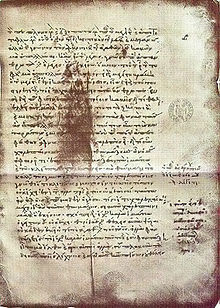- Discourses of Epictetus
-
The Discourses of Epictetus are a series of extracts of the teachings of the Stoic philosopher Epictetus written down by Arrian c. 108 AD. There were originally eight books, but only four now remain in their entirety, along with a few fragments of the others. In a preface attached to the Discourses, Arrian explains how he came to write them:
I neither wrote these Discourses of Epictetus in the way in which a man might write such things; nor did I make them public myself, inasmuch as I declare that I did not even write them. But whatever I heard him say, the same I attempted to write down in his own words as nearly as possible, for the purpose of preserving them as memorials to myself afterwards of the thoughts and the freedom of speech of Epictetus.[1]
The Discourses are unlikely to be word-for-word transcriptions and are probably written-up versions of Arrian's lecture notes. The books did not have a formal title in ancient times. Although Simplicius called them Diatribai (Discourses),[2] other writers gave them titles such as Dialexis (Talks),[3] Apomnêmoneumata (Records),[4] and Homiliai (Conversations).[5] The modern name comes from the titles given in the earliest medieval manuscript: "Arrian's Diatribai of Epictetus" (Greek: Αρριανου των Επικτητου Διατριβων).
Contents
Manuscript editions
The earliest manuscript of the Discourses is a twelfth-century manuscript kept at the Bodleian Library, Oxford. [6] In the Bodleian manuscript, a blot or stain has fallen onto one of the pages, and has made a series of words illegible;[7] in all the other known manuscripts these words (or sometimes the entire passage) are omitted,[8] thus all the other manuscripts are derived from this one archetype.[9]
The Discourses were first printed (in Greek) by Vettore Trincavelli, at Venice in 1535.[10]
English translations
The first English translation did not appear until 1758 with the appearance of Elizabeth Carter's translation. This proved to be very successful, with a second edition appearing a year later (1759), a third edition in 1768, and a fourth edition published posthumously in 1807. It influenced later translations: e.g. those of Higginson and George Long (see his Introduction for comments, some critical of Carter).
A complete list of English translations is as follows:
- Elizabeth Carter, (1758), All the works of Epictetus, which are now extant; consisting of his Discourses, preserved by Arrian, in four books, the Enchiridion, and fragments. (Richardson)
- Thomas Wentworth Higginson, (1865), The Works of Epictetus. Consisting of His Discourses, in Four Books, The Enchiridion, and Fragments. (Little, Brown, and Co.)
- George Long, (1877), The Discourses of Epictetus, with the Encheridion and Fragments. (George Bell)
- Percy Ewing Matheson, (1916), Epictetus: The Discourses and Manual together with Fragments of his Writings. (Oxford University Press)
- William Abbott Oldfather, (1925-8), Discourses. (Loeb Classical Library) ISBN 0-674-99145-1 and ISBN 0-674-99240-7
- Robin Hard (translation reviser), Christopher Gill (editor), (1995), The Discourses of Epictetus. (Everyman) ISBN 0-460-87312-1
- Robert Dobbin, (2008), Discourses and Selected Writings. (Penguin Classics) ISBN 0-140-44946-9
All of these are complete translations with the exception of Robert Dobbin's book which only contains 64 out of the 95 Discourses.
Notes
- ^ Epictetus, Discourses.
- ^ Simplicius, Commentary on Epictetus' Enchiridion.
- ^ Aulus Gellius, Attic Nights.
- ^ Stobaeus.
- ^ Photius, Biblioth. 58
- ^ Oxford University Philosophy Faculty Library - Manuscripts and rare books
- ^ Book 1. 18. 8-11
- ^ W. M. Lindsay (1896), An Introduction to Latin Textual Emendation, page 44.
- ^ Aston et al., (1984), The History of the University of Oxford, Oxford University Press.
- ^ Smith W (1870) Dictionary of Greek and Roman Biography and Mythology.
External links
- Elizabeth Carter, The Moral Discourses of Epictetus at the Internet Archive
- Thomas Wentworth Higginson, The Works of Epictetus at the Perseus Project
- George Long, The Discourses of Epictetus at the Internet Archive
- George Long, The Discourses of Epictetus at the Perseus Project
- Percy Ewing Matheson, Epictetus: The Discourses and Manual together with Fragments of his Writings at the Internet Archive
- William Abbott Oldfather, Epictetus. The Discourses As Reported by Arrian. Volume 1, Volume 2 at the Internet Archive
Stoicism Philosophers Early StoaZeno of Citium · Persaeus · Aristo · Sphaerus · Herillus · Cleanthes · Chrysippus · Zeno of Tarsus · Crates of Mallus · Diogenes of Babylon · Apollodorus · Antipater of TarsusMiddle StoaPanaetius · Dardanus · Mnesarchus · Hecato · Posidonius · Diodotus · Geminus · Antipater of Tyre · Athenodoros CananitesLate StoaSeneca · Cornutus · Musonius Rufus · Euphrates · Cleomedes · Epictetus · Hierocles · Sextus · Junius Rusticus · Marcus AureliusPhilosophy Concepts Adiaphora · Apatheia · Ataraxia · Diairesis · Eudaimonia · Katalepsis · Logos · Kathekon · Physis · Pneuma · ProhairesisWorks Dialogues (Seneca) · Discourses (Epictetus) · Enchiridion (Epictetus) · Epistles (Seneca) · Meditations (Marcus Aurelius) · The Republic (Zeno)Categories:- 2nd-century books
- Ancient Greek works
- Stoicism
- Cognitive science literature
- Works by Arrian
- Texts in Koine Greek
Wikimedia Foundation. 2010.

